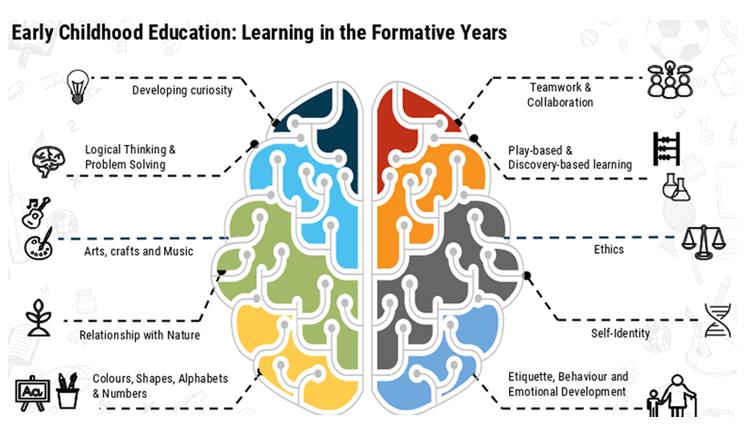
Opinion
�If we teach students today, as we taught yesterday, we rob them of tomorrow.� These words of John Dewey resonate across time. For decades, the education we received was different from what we needed. The realisation that school curriculum was focused on equipping students for the last century has been the driving force behind the changes reflected in the National Policy of Education (NEP). The policy has come at a time when schools have to adjust to new societal demands and expectations by transforming themselves. Much of the energy that will drive the economy will be generated in the classrooms. It is clear that without a skilled workforce, no community will prosper and no industry will thrive. Despite the best efforts of educationists, governments and other stakeholders, schools are struggling to meet the evolving needs of students and their future employers. This policy will help change the landscape of employment opportunities.
The school curriculum and pedagogy have been reconstructed for the foundational years � preschool, nursery, kindergarten, class one and two. Learning will take place through activities and the play-way method. In the preparatory stages of classes three, four and five, experiential learning will be transacted across disciplines. In the middle-level of classes six to eight, there will be an emphasis on subject-oriented pedagogy. In the secondary stages for classes nine to 12, innumerable aspects of flexibility for subject selection, student choices, break-out options for vocational training along with a gap year will help in developing various aspects of critical thinking, problem-solving, and decision making.
The NEP clearly states that the importance of school curriculum is inextricable from human wellbeing. For the first time, 21st-century skills will run like a thread through the curriculum and be woven across disciplines, crafts, practices and teaching strategies. Collaborative, innovative, critical thinking, problem-solving, decision-making will be coupled with digital literacy and information technology. Social and emotional skills will be embedded in the curriculum. Empathy, resilience, conflict resolution and relationship building are skills which offer the key to success in a rapidly changing world. The educational model envisaged in NEP will refine and re-engineer classroom transactions.
Students in senior schools have always grappled with the problem of selecting subjects across streams. With increased flexibility across arts and humanities, their choices have increased manifold. However, changes at this level will have to dovetail into decisions and admission processes at the university level, else the NEP will be an exercise in futility.
The assessment pattern is a welcome change. The shift to customised models of assessment will compel educators to make pedagogical practices more child-centred and policy-makers to review curricula and make them more skill-based. Such an approach will allow students to make mistakes, take risks, be creative and move away from rote learning. If we want our children to participate in PISA assessments and succeed, we have to change the way we teach and evaluate because the PISA does not test students on their memory. It attempts to assess if students can apply the knowledge they have gained. These tests affirm if countries have effective and inclusive education systems.
The greatest challenge facing us is teacher training. Teachers need to have an understanding of the method in which this extremely creative curriculum has to be transacted. At the grass roots level, the quality of education leaves much to be desired. A large number of in-service teachers have no professional qualifications and are tasked with innumerable administrative and social responsibilities, leaving them with little time for hands-on teaching, let alone training. There are pockets of excellence and expertise, but they are few and far between. The fundamental pedagogical structures of how we organise education have proved to be deeply resistant to change. This is one of the reasons that led to the failure and withdrawal of the continuous comprehensive evaluation (CCE) initiative.
If we want the NEP to succeed, we have to be careful to disrupt established norms. Every stakeholder at the state, district, sub-district, and block level has to take ownership of the NEP. Principals have to be trained in advance. Many of them � even in the urban areas � do not have the skills required for such changes. It is important to plan the mapping of resources and skillsets of teachers before the policy is actually rolled out. Standalone workshops will not suffice. Consistent inter and intra school training is needed.
The CBSE is the country�s most progressive board. It can start with pilot programmes to ensure the efficacy of this policy. It already has integrated many of the concepts mentioned in the NEP in its schools and has been involved in writing manuals and had conducted programmes and launched initiatives on competency-based education, joyful and experiential learning, art education, school quality assessments and a variety of other innovative pedagogies
The Board can train master instructors, who, in turn, can train principals and teachers. A scalable and sustainable model can be created. Transformation will take place only if we collaborate and create communities of teacher training and provide them with real-time feedback on their levels of readiness.
The entire education system will need to have an adaptive approach to ensure that our children succeed and find their place under the sun, nationally and globally.
Leave a comment: (Your email will not be published)